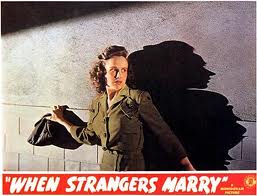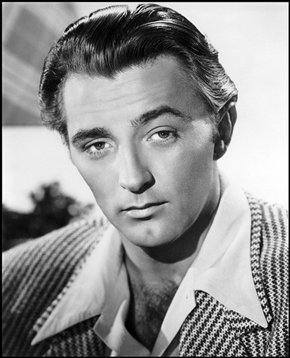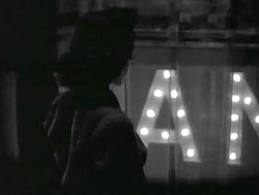
 |
|
|
|
Many film fans are already familiar with William Castle, the director who promoted himself into a publicity machine for his line of gimmicky, over-the-top horror entertainment. Alfred Hitchcock transformed himself into a spokesman for his "branded line" of movie thrillers and TV suspense shows, and Castle followed suit by inventing audience participation gags for his pictures: insurance policies, skeletons flying over the audience, "ghost viewers". But fifteen years earlier, one of Castle's first directing efforts tried openly to imitate Hitchcock's actual filmmaking style on a shoestring budget. An underdog favorite among critics, When Strangers Marry attracted special attention in the influential book Kings of the Bs edited by Todd McCarthy & Charles Flynn. It has a notable cast as well, with a very young Kim Hunter sharing many scenes with Robert Mitchum, then a supporting player being given one of his first substantial roles. The film's hero is played by Dean Jagger, when he had hair. Now that's an almost Hitchcockian twist in itself -- you might not immediately recognize Jagger. 
The film's is actually a blend of Hitchcock's well known Suspicion with Val Lewton's relatively obscure The Seventh Victim. Both are very strong influences on director Castle. As in The Seventh Victim, Kim Hunter wanders alone and intimidated into New York. This time she's Millie Baxter, a barely-kissed bride who knows very little about her husband, a traveling salesman named Paul (Dean Jagger). Millie doesn't know where her loyalties should lie when a police detective (Neil Hamilton, of Tarzan and His Mate and TV's Batman) questions her about Paul, who appears to be suspected in a murder committed out of town, on his sales route. Enter Millie's friendly passed-over beau Fred Graham (Robert Mitchum), who feels sorry for the abandoned bride and tries to help her solve her mystery, without stepping on her pride. During his infrequent visits, Paul acts very suspiciously -- and then disappears again, with little or no explanation. When Strangers Marry is almost a continuation of The Seventh Victim, with Kim Hunter's Mrs. Baxter only a little less naïve than her Mary Gibson character from before. Lou Lubin, the unlucky detective from the Lewton film, appears as well, cinching the argument that Castle was consciously aware of his homage to Victim. The screenplay does a good job of disguising the story's self-contradictory aspects, while director Castle has a field day concocting sub-Hitchcock visual sequences clearly thought out with storyboards. The camera tracks Millie's walking feet through hotel lobbies, and cranes to take in clocks and other bric-a-brac; it sometimes resembles a student film by a Hitchcock-addled undergraduate. In 1944, that's not at all a bad thing, for Castle's movie really stands out from the crowd -- I can imagine his Monogram Studio camera crew being happy to prove that they can shoot more than boring masters and singles. With the excuse that Millie hasn't a clue as to what's going on, the film obscures exactly what happens to the murder victim, the squeaky-voiced Dick Elliott. The killer is only seen over-the-shoulder, like the murderous Mr. "X" in the later D.O.A.. 
Poor Millie just doesn't know if her husband even wants her. Paul takes her for granted and goes paranoid whenever she talks to a stranger or asks him to explain anything, particularly what he does when he's off on those business trips. The apartment they borrow belongs to an unnamed friend; when the camera trucks into a photo of the owner, it turns out to be none other than the director! Castle's self-promotional side appeared early; in a FilmFax interview, later collaborator Robb White said that when he gave the director a ride in his Volkswagen, Castle would talk into an unconnected telephone receiver, pretending that he was a big shot carrying on a radio-phone conversation. Although Castle's direction of When Strangers Marry is a bit too awkward to be a serious challenge to Hitchcock, it shows a strong desire to get noticed. Then again, nobody was exactly looking for a series of imitation Hitchcock B-pictures. Castle's awareness of Val Lewton marks him as hip Hollywood hustler trying to establish his talent, and one of his next career steps was to work as an assistant to Orson Welles on The Lady from Shanghai.. As we all know, his real genius was for barnstorming showmanship, adapting the carny-style come-ons of exploitation quickies to give baby boom kids a special thrill. When Strangers Marry can't help but look cheap, what with all those close-ups of stage floors with haphazard standing-set carpets and furniture. The actors really make a difference. Kim Hunter is always good and Robert Mitchum's Fred Graham is both animated and outgoing... he even hugs his friendly dog! Just a few pictures later Mitchum would find his niche with a sleepy "I can't be bothered" attitude. Dean Jagger gets stuck with a patently inconsistent character and holds up his end as well as anybody could. With Hitchcock and Lewton references accounted for, director Castle seemingly wanted to get in on the short-lived wartime 'black musical' craze as well, a la Cabin in the Sky. Paul and Millie visit a hepcat Negro nightspot where a big dance is in progress. Although none of this cast is credited, the talented main female dancer's smile looks familiar -- yep, she's Marie Bryant, the all-purpose entertainer who sings the memorable (and creepy) song Your Red Wagon several years later in Nicholas Ray's They Live by Night. 
When Strangers Marry was produced by the King Brothers, who, depending on the source one reads, were either quasi-gangsters or dedicated mamma's boys. This film might be the King's first collaboration with Philip Yordan, a good screenwriter who also knew his way around fast, sharp deals. They went directly from this film to the (hard to believe) award winning Dillinger. When the blacklist hit, Yordan was in there early fronting for writers who couldn't work under their own names. The way Yordan's involvement is characterized in various interviews and memoirs, it's difficult to tell whether he was helping his blacklisted colleagues, or exploiting them. When he packaged properties around town -- that frequently bore his name as the only writer -- was he acting as their front, or exploiting them? The movie ends with a train scene that either copies Hitchcock (The Lady Vanishes) or predicts him (Strangers on a Train) depending on which film you choose. And up pops a memorable final-scene walk-on by none other than Rhonda Fleming, then a relative unknown. 
The Warner Archive Collection DVD-R of Betrayed (When Strangers Marry) is an excellent transfer of elements that don't seem to have been disturbed in 66 years. Picture and sound look great, showing us all the rough edges in the Monogram production. Every time the actors cross that same hotel lobby set, we expect them to collide with the Bowery Boys coming the other way. A plus for music fans -- the film carries a score by Dimitri Tiomkin. The WAC release carries the title from Monogram's 1948 reissue, Betrayed. Rhonda Fleming was originally not credited, but she's given a prime spot in a new end credits crawl to reflect her new star status. Monogram later became Allied Artists, which is how Warners acquired the rights and the printing elements. Monogram altered the original negative for the reissue, which explains the title change. Old TV prints and most critical references refer to the movie by the more memorable When Strangers Marry title, which is now lost. I guess we should be grateful that Monogram didn't cut anything out of the movie when it reissued it. That wouldn't have seemed necessary, since it's only 67 minutes long!
On a scale of Excellent, Good, Fair, and Poor,
Reviews on the Savant main site have additional credits information and are often updated and annotated with reader input and graphics. Also, don't forget the 2010 Savant Wish List. T'was Ever Thus.
Review Staff | About DVD Talk | Newsletter Subscribe | Join DVD Talk Forum |
| ||||||||||||||||||